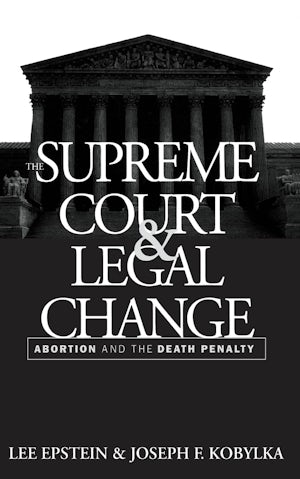The Supreme Court and Legal Change
Abortion and the Death Penalty
By Lee Epstein, Joseph F. Kobylka
436 pp., 6.125 x 9.25
-
Paperback ISBN: 978-0-8078-4384-0
Published: December 1992 -
E-book EPUB ISBN: 978-0-8078-6129-5
Published: November 2000 -
E-book PDF ISBN: 979-8-8908-6560-1
Published: November 2000
Buy this Book
- Paperback $65.00
- E-Book $29.99
Reviews
"A rich and useful account of the voting patterns in the Supreme Court . . . in two politically contentious areas."--Law and Politics Book Review
"Epstein and Kobylka's absorbing and well-written book encourages social scientists who are interested in the legal process to construct their own examinations of legal change beyond the authors' focus on the Supreme Court and into other contentious areas beyond their comparative case studies of abortion and capital punishment. . . . Epstein and Kobylka provide an equally perceptive treatment of Roe and its progeny."--Legal Studies Forum
"A groundbreaking look at the key role played by 'friends of the court' in affecting doctrinal change at the Supreme Court. The justices may not look at election returns when they decide their cases, but they do look at the amicus curiae briefs filed before them. This is the first work that takes a comprehensive--and readable--look at the Supreme Court as a political player on the American scene."--Tony Mauro, Supreme Court correspondent for USA Today and Supreme Court columnist for Legal Times
"An important contribution to our understanding of the dynamics and consequences of interest group litigation in the Supreme Court. Epstein and Kobylka emphasize the crucial nature of choices about which arguments to press at which times in the Supreme Court, and their case studies convincingly underline this point. This book is a nice combination of rigorous theorizing about the sources of legal change and careful analyses of law, politics, and doctrine. I heartily recommend it."--Gregory Caldeira, Ohio State University




